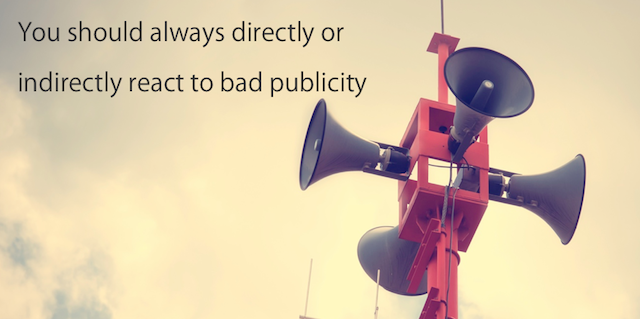 Anna Łowczowska
created
edited
Anna Łowczowska
created
edited
Publicity – make it works for you!
Back to list of articlesThey say that no matter what they say about you, it is always good to be talked about. This is said to true of celebrities, pop culture products and, more relevant here, to companies. Publicity is the lifeblood of any actor on the public stage and it’s generally agreed that more is better.
Anything that gets your name or product in front of consumers is should be welcomed. While you can’t control what is said and written about you, your company should have some kind of strategy in place to manage your name and image to the greatest extent possible and to use whatever you can to your advantage. Use the publicity you don’t pay for the complement your paid advertising objectives.
It’s hard to argue with the idea that publicity raise your profile and bring new business. Still, in order to achieve the greatest results from this type of promotion, you should keep in mind a few things that will help you to ride the publicity wave.

Are there any rules?
An obvious advantage to a publicity-based campaign as opposed to a paid marketing campaign is its cost. It’s not unheard of the get the same or comparable results for free, or almost free, as expensive media promotions.
People tend to rely more on genuine content than ads while shaping their opinions on a subject. This is why the context in which your company may be presented is everything. Luckily, attempts at receiving publicity can (and should) be tailored, just the way your services are. For example, you can get involved in the life of your customers to raise awareness of your company among it, and the media, too. You can do so through various sponsorship opportunities, organizing social events, or raising funds for a particular goal. Philanthropy and activation of groups of people often focus the attention of the media, and will present you in a good light.
Prepare your publicity strategy
One important aspect is your own potential as a „newsmaker”. Try to come up with something attractive both to the media and your customers. This may be a particularly outstanding quality of your product or service, an especially interesting innovation, or a social value to your business activities. On the other hand, uniqueness and even a strange kind of quality to what you do can serve as a hook to get attention. Think about the kind of things that catch your eye about what other companies are doing.
More specifically targeted offers may involve sending press releases to the media your customers are interested in (more on writing a press release). The variety of media you can reach out to should be broad but not unlimited, and your offer should in some way refer to their field. Think of addressing specialist periodicals and magazines, local newspapers, as well as using social media.

The more buzz you stir around your business, the better. And don’t worry, even though good opinions will always be more desirable, there are instances of positive marketing outcomes resulting from seemingly negative media coverage, which can never be avoided. This is not a rule, though. You should always directly or indirectly react to bad publicity. Be honest and apologetic if you have made any mistakes or some of your products proved to be faulty. Appoint a person responsible for the contact with journalists. The key is to be ready for unwanted bad publicity, so it will not be an exaggeration to set procedures dealing with such situations in advance and always be informed on what is being said or written about your business.
It may require time and money to prepare an effective publicity strategy, but once you get there, the credibility given to your brand will be far greater than it is the case with regular ad campaigns, so it is time to start thinking about your own plan if you haven’t already.

